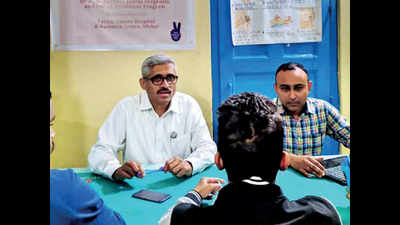- News
- City News
- chennai News
- Padma Shri doctor from Chennai who is saving patients in Assam
Trending
This story is from January 28, 2020
Padma Shri doctor from Chennai who is saving patients in Assam
Bomb blasts and floods were the two things that came to mind when senior surgical oncologist Dr Ravi Kannan got an offer to head a hospital in facility.

Dr Ravi Kannan (in white shirt) has subsidised medical costs and helped poor patients’ kin have an additional income
CHENNAI: Bomb blasts and floods were the two things that came to mind when senior surgical oncologist Dr Ravi Kannan got an offer to head a hospital in facility. A weekend at the hospital in 2007 changed his opinion about the state. The 13 years he spent taking cancer treatment to the doorstep of poor patients, improving follow-up care and subsidising medical costs, earned him the Padma Shri this year.
It started with a visit to the Cachar Cancer Hospital in Silchar on request. As he was going around the wards of the hospital, his wife Seetha mingled with the community. He quit his practice in Chennai and joined the hospital, while his wife, Seetha, quit her job for voluntary service.
"I thought if we offer low cost many people will come," he said. But he soon realised that the needs of patients in Silchar were far more than those of patients in south India.
Most of the people there lived in poverty. So, when he saw a child eating puffed rice soaked in water with chillies, he spoke to the management and opened a free kitchen. "I thought with free food and shelter people will be happy to receive treatment. In many cases treatment was free too. So it was good. Or so I thought," he said.
That’s when the hospital decided to offer jobs to patients and their attenders. Initially, it was planning jobs like tailoring and candle making, but found that people also needed training.
"So, we offered them jobs that required unskilled labour. They could clean wards or water plants for Rs100 a day. Some would do plumbing and carpentry," he said.
Hospital social workers were given cellphones to remind people of follow up schedules. Some patients paid an annual fee of Rs500 for consultation with multiple specialists and some paid nothing. If they did not return, medical teams were sent for free homecare. Soon, compliance went up to 70%.
But there is one thing that hasn’t changed since 2007 — the weekly calls he has been having with his mentor Dr Shanta to discuss the disease, treatment and problems. "Medical schools don’t teach you service, but teachers like her and Dr S Krishnamurthi do. Like her, I give away the cash I receive as awards so poor can benefit," he said.
Read the story in Bengali
It started with a visit to the Cachar Cancer Hospital in Silchar on request. As he was going around the wards of the hospital, his wife Seetha mingled with the community. He quit his practice in Chennai and joined the hospital, while his wife, Seetha, quit her job for voluntary service.
"I thought if we offer low cost many people will come," he said. But he soon realised that the needs of patients in Silchar were far more than those of patients in south India.
Most of the people there lived in poverty. So, when he saw a child eating puffed rice soaked in water with chillies, he spoke to the management and opened a free kitchen. "I thought with free food and shelter people will be happy to receive treatment. In many cases treatment was free too. So it was good. Or so I thought," he said.
In 2011, results of an in-house study crashed all hopes. "We found only 58% of people who tested positive for cancer didn’t return for treatment. Only 28% completed treatment. People were dying in pain and agony. If they have to come for treatment, they need to be accompanied by a family member, who will have to lose their wages and the family will starve," he said.
That’s when the hospital decided to offer jobs to patients and their attenders. Initially, it was planning jobs like tailoring and candle making, but found that people also needed training.
"So, we offered them jobs that required unskilled labour. They could clean wards or water plants for Rs100 a day. Some would do plumbing and carpentry," he said.
Hospital social workers were given cellphones to remind people of follow up schedules. Some patients paid an annual fee of Rs500 for consultation with multiple specialists and some paid nothing. If they did not return, medical teams were sent for free homecare. Soon, compliance went up to 70%.
But there is one thing that hasn’t changed since 2007 — the weekly calls he has been having with his mentor Dr Shanta to discuss the disease, treatment and problems. "Medical schools don’t teach you service, but teachers like her and Dr S Krishnamurthi do. Like her, I give away the cash I receive as awards so poor can benefit," he said.
Read the story in Bengali
End of Article
FOLLOW US ON SOCIAL MEDIA










